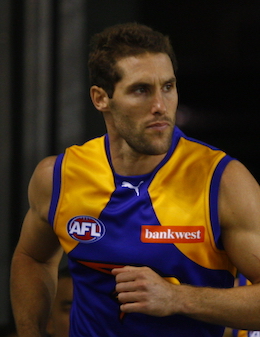|
HALL OF FAME INDUCTEE Darren Glass |
|
|---|---|
| Year Inducted | 2019 |
| Date of Birth | 14th May 1981 |
Player 1998–2014 (Perth 1998-2004, West Coast 2000-2014)
Games 318 (Perth 48, West Coast 270)
Goals 16 (Perth 8, West Coast 8)
Honours: West Coast Eagles premiership player 2006; West Coast Club Champion 2007, 2009, 2011; West Coast Eagles captain 2008–2014; All-Australian 2006, 2007, 2011, 2012 (captain).
As the West Coast Eagles’ longest serving captain behind John Worsfold, Darren Glass will always be remembered as a true club champion and one of the greatest full-backs to play the game. The fact that he captained a club with such a star-studded line-up for most of his career, demonstrates the high regard in which he was held and the leadership abilities that underlined his courage, durability and success against some of the modern game’s greatest forwards including Matthew Lloyd, Nick Riewoldt, Jonathon Brown and Matthew Pavlich.
Rarely beaten in one-on-one contests, Glass’s ability to lead his team from full-back resulted in four All-Australian selections and three club fairest and best awards during an AFL career that spanned 270 games across 15 seasons.
Darren Charles Glass was born on May 14th 1981 in the WA town of Northam and moved to Perth where he attended Carine Senior High School. Country zoned to Perth Football Club, he began his career in the WAFL with the Demons and played two seasons before being recruited by West Coast with the 11th selection in the 1999 AFL National Draft. He made his AFL debut the following season in Round 4 against Adelaide.
In his first four seasons, Glass struggled to cement a place in the side, competing for his position with premiership full-back Ashley McIntosh. However, Glass continued to play with sheer effort and determination and following McIntosh's retirement, he received greater opportunities and showed rapid improvement.
He went from being a serviceable full-back to dominating against full-forwards and became the master of his domain. Although he still held a relatively low profile in a team gifted with big-name stars such as Ben Cousins, Chris Judd and Daniel Kerr, it wasn’t until the epic 2005 and 2006 Grand Finals against Sydney that Glass cemented his reputation among the club’s elite list of players.
In 2006, Glass took his game to a new level, earning his first All-Australian selection and performing a vital role against Sydney Swans’ spearhead Barry Hall in the Eagles’ one-point Premiership victory. The Age Newspaper reported in 2013 that Hall was left “haunted for years by the flogging he copped at the hands of Darren Glass” in the 2006 AFL Grand Final.
Glass again received All-Australian honours in 2007 and won West Coast’s fairest and best award in one of his best individual seasons. Glass was a popular choice for club captain in 2008 following the departure of Chris Judd to Carlton, and he led the team with distinction, going on to win another two fairest and best awards in 2009, and 2011.
In 2012 Glass received his fourth All-Australian selection and was named as the captain of the All-Australian team in recognition of his outstanding leadership ability.
In 2013, at the age of 32, Glass played on with West Coast despite injury concerns and had another consistent season, encouraging him to return again in 2014. However, injuries continued to take a toll on his body and on June 12th 2014, Glass announced his retirement effective immediately, bringing to an end his 270-game career at West Coast.
Glass’s selfless attitude and team-first approach to football was highlighted by his refusal to play a farewell game at the expense of another player missing out on a game.
His coach for the majority of his career and fellow club legend, John Worsfold, paid tribute to the long-serving defender, describing him as a role model, leader, and gentleman of immense values. “And he was a super footballer,” Worsfold said.
The Sunday Times reported that “Glass will sit close to Worsfold as possibly the Eagles’ finest ever captain and vies for recognition … among West Coast’s greatest contributors.”
The year following his retirement, Glass completed a Master of Business Administration degree at the University of Western Australia. He worked as a management consultant before deciding to return to football at the end of the 2017 AFL season, when he accepted an assistant coaching position at Hawthorn Football Club.



